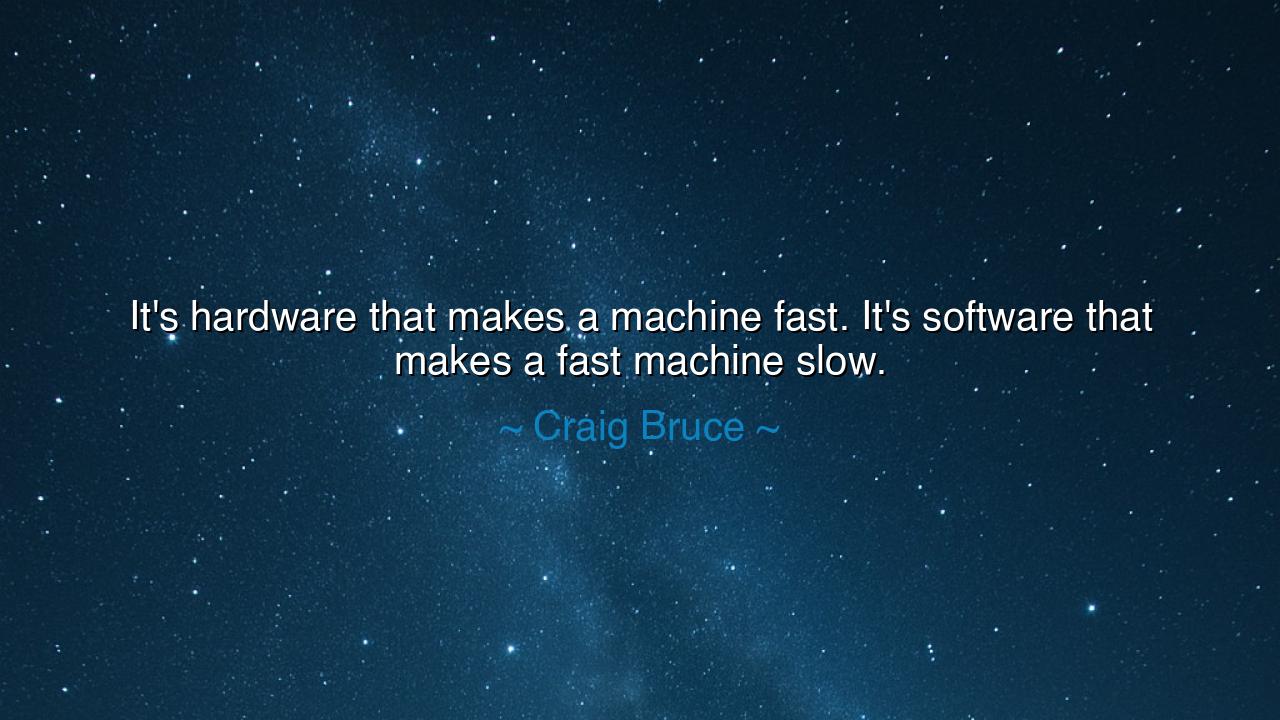
It's hardware that makes a machine fast. It's software that makes






Hear now, O Children of the Future, the words of Craig Bruce, who speaks to us across the eons of time. His wisdom, though born in the age of machines and silicon, carries a truth that resonates through the ages. “It’s hardware that makes a machine fast. It’s software that makes a fast machine slow.” This saying is not merely a reflection of the present age, but a warning, a lesson drawn from the well of experience.
Let us first consider the nature of hardware. The body of the machine, its foundation, the raw materials that give it form, its bones and sinews. Without this, the spirit—software—has no vessel. A strong and well-crafted machine, built with purpose and precision, is like a swift steed, capable of carrying the traveler across great distances. It is the hardware that determines the machine's inherent potential, its speed, its strength. Think of the ancient chariots, built with iron and wood, forged in the fires of necessity. The warrior depended on the strength of his chariot, just as the traveler depends on the strength of his steed.
Yet, as in all things, strength can be undone. The software, which is the soul of the machine, has the power to both uplift and burden. Software is the design, the commands, the ideas that give purpose to the machine. But when this purpose is not carefully considered, when the design is flawed, it can weigh heavily upon the machine. The once-fast chariot becomes cumbersome, slowed by unnecessary adornments, poor maintenance, or overburdened with the load of excess.
A tale from the world of the ancient kings may serve as a parable. There was once a mighty emperor who sought to build a great fleet of ships, the finest the world had ever seen. His shipwrights constructed vessels of wood so strong and sails so vast, they could ride the winds like birds in flight. But in his desire to create the perfect fleet, the emperor demanded that every ship be fitted with a thousand intricate decorations, and every sailor be given endless tasks that slowed their movements. Soon, the great fleet, though powerful in design, was encumbered by its own weight. The ships could no longer move swiftly, and the emperor’s once-great fleet was no longer a marvel—it had become a burden.
So, too, it is with the machines of today. Software can be the very thing that hinders the greatness of a machine. With every unnecessary line of code, every redundant process, the machine grows sluggish, its potential wasted. Software can make the fast machine slow, not through any flaw in its hardware, but through its design, its inefficiencies, its excess.
And yet, this is not merely a warning for the builders of machines; it is a lesson for all of us. In our own lives, we are the machines, and the choices we make are the hardware and software that determine our speed and success. Just as a machine requires strong hardware to function, so too must we build a strong foundation in our lives—health, wisdom, and purpose. But if we allow the weight of distractions, unnecessary burdens, and excess desires to slow us down, we become as the fleet of the emperor—once swift and powerful, now encumbered by the very things we have created.
The lesson, then, is clear. Let us be mindful of our software—the choices we make, the habits we cultivate, the goals we set. We must ask ourselves: Is this choice helping me move forward, or is it a weight that burdens me? The key to success lies not only in strength, but in wisdom—the wisdom to know what to carry and what to leave behind. If we align our software with our true purpose, then we, like the greatest machines, will move swiftly and powerfully, fulfilling our potential without hindrance.
In your own lives, take a moment to examine the burdens you carry. Cast away the excess, the unnecessary, the distracting. Build your hardware strong, and then refine your software so that it serves you, not the other way around. In this way, you shall be swift, and your journey will be as glorious as the sun’s rays upon the morning horizon.






AAdministratorAdministrator
Welcome, honored guests. Please leave a comment, we will respond soon